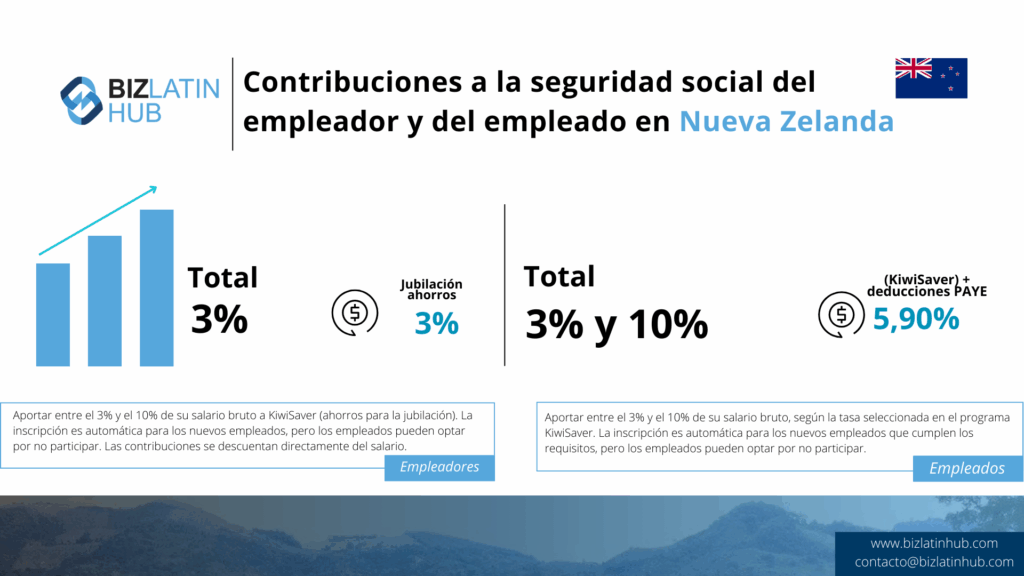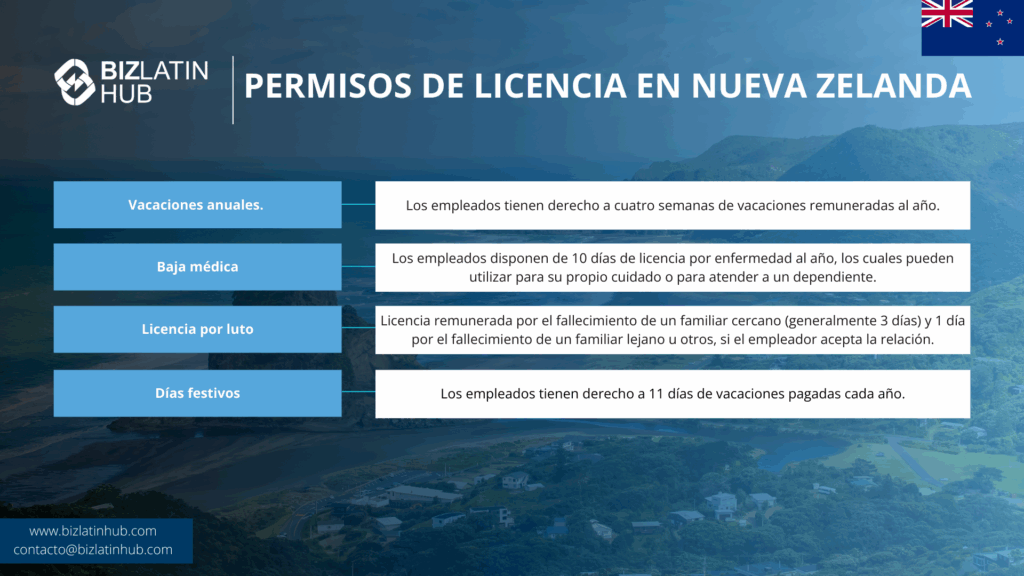Como tercera economía más libre del mundo, Nueva Zelanda es un entorno atractivo para la constitución de una empresa. Este pequeño país recibe grandes sumas de inversión extranjera directa, comercio mundial y tiene su buena ración de acuerdos de libre comercio. Dadas todas estas tentadoras características de la economía, no es de extrañar que tantos inversores y empresarios extranjeros se planteen contratar empleados en Nueva Zelanda. Esta guía detalla los requisitos esenciales para los empresarios en virtud de la Ley de Relaciones Laborales de 2000, desde los contratos y la retribución hasta el ahorro para la jubilación y la resolución de conflictos.
Puntos clave: Legislación laboral neozelandesa
| ¿Son legales los contratos verbales en Nueva Zelanda? | No, un contrato de trabajo escrito es obligatorio para todo trabajador. |
| ¿Cuáles son las obligaciones del empresario en relación con el plan de jubilación KiwiSaver? | Se debe abonar una cantidad igual al régimen KiwiSaver como porcentaje del salario bruto del trabajador. Puede llegar hasta el 10%. |
| ¿Qué tipos de permisos existen en NZ? | Hay cuatro tipos de permisos a los que tienen derecho todos los trabajadores. |
| ¿Qué es un periodo de prueba de 90 días y cuándo se puede utilizar? | El salario mínimo de los adultos en Nueva Zelanda es de 23,15 NZ$ por hora a partir de enero de 2025. Esto equivale a 926 dólares neozelandeses a la semana. |
| ¿Qué es un agravio personal? | Una reclamación personal es una queja formal que un trabajador puede plantear contra su empresario si cree que ha sido tratado injustamente o que se ha incumplido su acuerdo laboral. El motivo más frecuente es el despido injustificado. |
Principales obligaciones del empresario en Nueva Zelanda
Antes de trasladarse a esta jurisdicción, es importante que las empresas comprendan los derechos y responsabilidades laborales de empresarios y empleados en Nueva Zelanda. Lo que sigue son algunas cosas que los empresarios extranjeros deben saber sobre la cultura laboral local:
- Horas de trabajo – La jornada laboral estándar en Nueva Zelanda es de ocho horas, con una semana laboral estándar de hasta 40 horas.
- Días festivos – En Nueva Zelanda hay 11 días festivos al año.
- Vacaciones – Los trabajadores de Nueva Zelanda tienen derecho a cuatro semanas de vacaciones al año. Los padres cuidadores principales tienen derecho a 26 semanas de vacaciones.
- Tipos de contrato – En Nueva Zelanda existen esencialmente dos tipos de contrato, el empleo indefinido y el empleo de duración determinada
1. Proporcionar un acuerdo de empleo por escrito
Todo trabajador debe tener un acuerdo laboral por escrito. Puede ser un convenio individual o un convenio colectivo. Debe contener determinadas cláusulas obligatorias.
Consejo de experto: La cláusula del periodo de prueba de 90 días
Según nuestra experiencia, el periodo de prueba de 90 días es una poderosa herramienta para los empresarios, pero con frecuencia se aplica incorrectamente. Para que el periodo de prueba sea legalmente válido, debe cumplir dos condiciones estrictas: 1) el empresario debe tener 19 o menos empleados en el momento de la contratación, y 2) la cláusula del periodo de prueba debe incluirse en un contrato de trabajo escrito que firmen ambas partes antes de que el empleado empiece a trabajar.
Aconsejamos a los clientes que ultimen y firmen el acuerdo con bastante antelación a la fecha de inicio, ya que un empleado que empiece a trabajar incluso un día antes de firmar no está legalmente en periodo de prueba, lo que elimina la protección del empresario frente a una reclamación personal por despido.
2. Cumplir el salario mínimo y los derechos a vacaciones
Los empresarios deben pagar al menos el salario mínimo vigente y proporcionar a los empleados sus derechos mínimos de vacaciones anuales, por enfermedad y por duelo, así como días libres retribuidos por festivos.
3. Gestionar las cotizaciones a KiwiSaver y a la nómina
Los empresarios deben gestionar las retenciones en nómina del impuesto sobre la renta Pay As You Earn (PAYE) y realizar las cotizaciones obligatorias al plan de jubilación KiwiSaver para los trabajadores cotizantes.
4. Sigue los Procedimientos de Despido y Reclamaciones Personales
Un empresario debe tener un motivo legalmente válido y seguir un proceso justo para despedir a un empleado. No hacerlo puede dar lugar a una demanda por agravio personal.
La Ley de Relaciones Laborales de 2018

Política y negocios en Nueva Zelanda han intentado trabajar juntos durante los últimos tres años. En cuanto al derecho laboral y las empresas, el cambio legislativo más reciente realizado por el equipo ha sido el Ley de Relaciones Laborales de 2018. Establecidas en 2018, estas nuevas leyes están ahora en pleno vigor.
Aparte de los cambios introducidos en materia de regulación sindical, como ya se ha mencionado, la ley también mejora la equidad y la seguridad de los trabajadores en el lugar de trabajo. En general, los principales cambios de la ley son los siguientes:
- Establezca pausas para descansar y comer
- Períodos de prueba limitados de 90 días para empresas con 19 o menos empleados
- Readmisión de los trabajadores despedidos injustamente
- Restablecer las protecciones y regulaciones para los empleados vulnerables de la industria
- Refuerza la negociación colectiva y los derechos sindicales
El Grupo de Trabajo Conjunto
Aunque se estableció hace casi 50 años, la Ley de Igualdad Salarial de 1972 de Nueva Zelanda está recibiendo más atención ahora que nunca. Esto se produce después de que las diferencias salariales entre géneros alcanzaran un asombroso 16% en 1998, y siguieran rondando el 13% en 2016. Como consecuencia, el gobierno creó en 2015 el Grupo de Trabajo Conjunto sobre Principios de Igualdad Salarial (el GCT).
Como organización gubernamental, el GTC desarrolla y propone ideas y recomendaciones legislativas. Idealmente, estos cambios disminuyen la discrepancia salarial entre géneros en Nueva Zelanda. En un futuro próximo, el gobierno espera introducir modificaciones en la Ley de Igualdad Salarial de 1972, así como en la Ley de Relaciones Laborales, para incluir un protocolo para las demandas de igualdad salarial. También se habla de exigir a los empresarios que publiquen datos sobre las estadísticas de diferencias salariales entre empleados y empleadas. Esto hará que el tema en cuestión sea más transparente.
Ventajas para los empresarios que contraten empleados en Nueva Zelanda
Aunque hay nuevas leyes que cumplir, los empresarios también salen ganando con estos cambios. Normalmente, los empleados que trabajan en condiciones más seguras y agradables suelen estar más contentos y comprometidos. Como resultado, los empleados que están contentos en el lugar de trabajo son un 20% más productivos que los que no lo están, por lo que tu empresa saldrá beneficiada en última instancia. Por ejemplo, Noruega tiene una legislación laboral similar, y ocupa el segundo lugar del mundo en términos de felicidad y satisfacción de los empleados. También tienen el octavo PIB per cápita más alto del mundo.
Cuánto cuesta contratar personal en Nueva Zelanda

El coste de contratación en Nueva Zelanda es inferior al que tendría en naciones más ricas, y sin embargo los trabajadores suelen estar bien cualificados y capacitados. Gracias a la importante inversión realizada en educación durante varios años, Nueva Zelanda tiene ahora un exceso de licenciados en el mercado laboral para los que no puede proporcionar puestos de trabajo locales. Esto significa que el mercado laboral de Nueva Zelanda es relativamente competitivo para un posible empleador entrante.
El salario mínimo en Nueva Zelanda es de 926 dólares neozelandeses semanales para un adulto. Sin embargo, no es necesariamente la tarifa que debes ofrecer. En los sectores punteros que requieren trabajadores cualificados y expertos, tendrás que ofrecer al menos la tarifa estándar del mercado. Un experto en contratación local en Nueva Zelanda te será de gran ayuda para asegurarte de que no pagas de más ni ofreces tarifas poco atractivas que dificulten la contratación de talentos de calidad.
El papel de la Autoridad de Relaciones Laborales (ERA)
La Autoridad de Relaciones Laborales (ERA) es un organismo gubernamental independiente que ayuda a resolver los problemas de las relaciones laborales. Investiga y toma decisiones sobre los conflictos que empresarios y trabajadores no pueden resolver por sí mismos, incluidas las reclamaciones por agravios personales o salarios impagados.
Dos opciones para contratar: crear una empresa o OEP
A la hora de entrar en el mercado y contratar en Nueva Zelanda, existen esencialmente dos opciones a disposición de los inversores y empresarios. La forma más habitual de hacerlo es mediante la constitución de una sociedad completa para establecer una presencia en la jurisdicción. Sin embargo, esto puede llevar tiempo y esfuerzo, por lo que merece la pena considerar también otra opción, recurrir a una Organización Profesional Patronal (OEP).
OEP: rápido y ágil
Una Organización Profesional de Empleadores (OEP), también conocida como “Empleador Registrado” o “Empleador de Registro”, es una organización que proporciona y apoya a las empresas en sus funciones de recursos humanos, desde las primeras fases de contratación hasta el pago de impuestos y prestaciones. Las OPE se encargan de las tareas fundamentales y laboriosas de los equipos de recursos humanos, lo que permite a las empresas centrarse en el crecimiento y el éxito de su negocio.
Los servicios de un OEP son especialmente útiles cuando las empresas quieren contratar mano de obra local pero no desean establecer una entidad jurídica local. En pocas palabras, un OEP facilita la contratación de personal en Nueva Zelanda a través de un proveedor externo. Significa que puedes entrar en el mercado y empezar a contratar rápidamente, sin tener que comprometerte a entrar de lleno hasta que estés seguro de que es lo que quieres hacer. Cabe señalar que a nivel regional está empezando a haber más regulación y que OEP en Nueva Zelanda puede no ser viable en el futuro.
La opción a largo plazo: contratación directa
Este es el estándar de oro de la contratación en Nueva Zelanda, ya que te dará un control total sobre tus empleados, así como la seguridad de que cumplirás las normas a largo plazo. También te da un estatus más alto ante los posibles solicitantes de empleo, que te verán como un empleador más seguro a largo plazo.
Antes de empezar a contratar empleados en Nueva Zelanda, primero tendrás que hacerte una idea de la situación legal, financiera y cultural del país. Por ejemplo, cómo resolver los trámites burocráticos asociados a la constitución de una sociedad y cómo gestionar las nóminas. Con una presencia legal permanente en Nueva Zelanda, serás plenamente responsable del cumplimiento de la legislación local.
Un experto local te ayudará a la hora de contratar en Nueva Zelanda, ya que dispondrá de una amplia red de profesionales cualificados para los mejores puestos, así como de una buena idea del mercado laboral local. Podrán aconsejarte sobre las mejores tarifas que puedes ofrecer y el tipo de perfil al que debes dirigirte. Dada la importancia de la legislación antidiscriminatoria en Nueva Zelanda, sobre todo para los puestos más altos, pueden asegurarse de que haces una oferta justa que cumple la legislación local.
Tras publicar los anuncios y recibir las solicitudes, deberás pasar a entrevistar a los posibles candidatos. Esto debe hacerlo, como mínimo, un jefe de equipo y un representante de RRHH, para asegurarte de que todo es legal. Puede que quieras incluir a otras personas en el proceso para evaluar mejor al candidato.
Es muy posible que desees realizar una segunda entrevista, en la que posiblemente participen otros miembros del equipo, como se ha comentado anteriormente. También es habitual en la región y al contratar en Nueva Zelanda proporcionar a los candidatos una tarea de aptitud que deben completar. Esto suele adoptar la forma de una tarea ficticia que simula el tipo de trabajo que se hará en el futuro y confirma que poseen las aptitudes citadas en su CV.
Por último, tu asesor local podrá ayudarte con las fases del proceso de contratación e incorporación. Se asegurarán de que cumples los requisitos estándar, como las revisiones médicas obligatorias, y de que el periodo de prueba está dentro de los límites establecidos por la legislación laboral de Nueva Zelanda. Suele ser de tres meses.
Cuatro sectores clave en Nueva Zelanda
El sector agrícola es el pan de cada día de su economía local y de exportación, y atrae un alto grado de inversión extranjera en Nueva Zelanda. A pesar de su tamaño, la nación insular del Pacífico es el mayor exportador de lácteos del mundo. Esta actividad está centralizada por el capo lácteo del país, el Grupo Cooperativo Fonterra. Además, las exportaciones de carne roja del país están creciendo rápidamente.
La construcción está respondiendo al auge demográfico de las zonas urbanas de Nueva Zelanda. El movimiento de personas y la inmigración a los puntos neurálgicos de negocios y estilo de vida de Nueva Zelanda han puesto a prueba la disponibilidad de viviendas. En concreto, la ciudad de Auckland está experimentando una crisis de la vivienda que el gobierno se esfuerza por resolver. Los expertos del sector prevén que será necesario construir 15.000 viviendas más al año para mantener el ritmo de crecimiento.
Uno de los más destacados en la lista de éxitos económicos de Nueva Zelanda es el sector servicios, que se está desarrollando rápidamente. Este sector representa en torno al 70% del PIB del país, siendo el transporte y la logística la mayor industria. Se dice que las empresas locales gastan, de media, alrededor de un 40% más en servicios que en sueldos y salarios.
Nueva Zelanda sustenta un inmenso sector turístico promocionando sus pintorescos paisajes y sus diversas experiencias de aventura. Es la mayor industria de exportación del país en cuanto a ingresos en divisas. Los ingresos del turismo representaron el 6,1% del PIB nacional, con un total de 15.900 millones de dólares. El sector emplea al 8% de la población neozelandesa. Este crecimiento récord se atribuye en gran medida a la creciente afluencia de turistas chinos acomodados.
¿Qué importancia tienen los sindicatos en Nueva Zelanda?
La formación y la cultura que rodean a los sindicatos en Nueva Zelanda son fuertes. Es importante saber que los sindicatos son una parte importante de la vida y los derechos de los trabajadores del país. Las leyes recientes han cambiado la normativa en torno a los sindicatos y los empresarios. En particular, estos cambios proceden de la Ley de Relaciones Laborales de 2018. Estos cambios incluyen, entre otros, los siguientes:
- Plazos de inicio más tempranos para los sindicatos en la negociación colectiva
- Los empresarios no pueden descontar el salario por huelgas parciales
- Los representantes sindicales pueden entrar en los lugares de trabajo sin consentimiento en algunas circunstancias
- El formulario prescrito para que los nuevos empleados indiquen si tienen intención de afiliarse a un sindicato
- Tiempo remunerado razonable para los delegados sindicales
- Protección de los empleados contra la discriminación por afiliación sindical
En general, los sindicatos de Nueva Zelanda son muy activos bajo el gobierno actual. Es crucial para cualquier empresa que se establezca en Nueva Zelanda comprender la evolución de la normativa en torno a los sindicatos. Desempeñan un enorme papel en el clima y la funcionalidad de la economía del país.

Preguntas frecuentes sobre la contratación de empleados en Nueva Zelanda
Según nuestra experiencia, éstas son las preguntas más habituales que recibimos de los clientes que quieren contratar en Nueva Zelanda.
La legislación laboral de Nueva Zelanda garantiza que tanto empresarios como trabajadores tengan derechos y responsabilidades. Los empresarios deben tratar a los empleados con equidad, proporcionarles al menos el salario mínimo establecido por el gobierno y cumplir otras obligaciones de la legislación laboral. Además, los empresarios deben garantizar un entorno de trabajo seguro para sus empleados.
En Nueva Zelanda no hay un requisito mínimo establecido para el número de horas de una jornada laboral estándar. Sin embargo, es habitual que los empleados a tiempo completo trabajen entre 7,5 y 8,0 horas al día. Es importante que el número de horas trabajadas por un empleado, independientemente de si supera o no las 40 horas semanales, se especifique en el contrato de trabajo.
El salario mínimo en Nueva Zelanda es de 23,15 dólares neozelandeses por hora para los adultos, 18,16 dólares neozelandeses por hora para los trabajadores principiantes y 18,16 dólares neozelandeses por hora para los trabajadores en formación.
El pago de las horas extraordinarias en Nueva Zelanda no está establecido por ley, por lo que los empresarios no están obligados a pagar a los empleados más de su salario habitual. Sin embargo, algunos convenios pueden especificar que los empleados cobrarán una hora y media por las horas extraordinarias realizadas hasta un determinado número de horas en un día concreto, y el doble por las horas extraordinarias adicionales realizadas ese mismo día.
Para despedir a un empleado en Nueva Zelanda, el empresario debe tener un motivo válido para el despido, como mala conducta reiterada, problemas relacionados con el rendimiento o incapacidad. El procedimiento aceptado suele consistir en un apercibimiento verbal, seguido de un apercibimiento formal por escrito, un último apercibimiento por escrito y, si es necesario, el despido. En caso de falta grave o flagrante, el empresario puede despedir al trabajador sin previo aviso.
KiwiSaver es un plan voluntario de ahorro para la jubilación basado en el trabajo. Las empresas están obligadas a afiliar automáticamente a los nuevos empleados que reúnan los requisitos y deben aportar un mínimo del 3% del salario bruto del empleado, si éste opta por contribuir.
Todos los empleados tienen derecho a cuatro tipos principales de vacaciones: vacaciones anuales (cuatro semanas al año), baja por enfermedad (diez días al año), baja por fallecimiento y días festivos (días libres retribuidos).
Una reclamación personal es una queja formal que un trabajador puede plantear contra su empresario si cree que ha sido tratado injustamente o que se ha incumplido su acuerdo laboral. El motivo más frecuente es el despido injustificado.
Biz Latin Hub puede ayudarte a contratar empleados en Nueva Zelanda
Las leyes laborales, las inversiones extranjeras y la creación de empresas en mercados extranjeros pueden parecer desalentadoras. Con el exceso de leyes, reglamentos, excepciones a la norma y una política en constante cambio, puede resultar difícil navegar por la expansión y/o el establecimiento de tu empresa.
¡Para eso está Biz Latin Hub! Con experiencia en servicios de back office y representación comercial en el extranjero, podemos ayudarte a ti y a tu empresa a entrar en mercados extranjeros de todo el mundo. Si te intrigan las oportunidades de negocio que te esperan en Nueva Zelanda, ponte en contacto con nosotros aquí si te interesa o tienes alguna pregunta.






